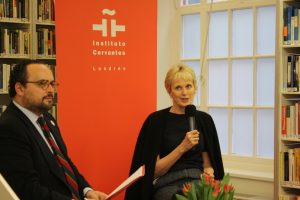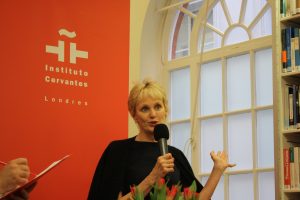Siri Hustvedt, the most feminist, ethical and Dickensian writer is awarded Princess of Asturias Award for Literature
American writer Siri Hustvedt, recipient of the Princess of Asturias Award for Literature 2019, said that the recognition was «a mixture of gratitude, surprise and happiness» at a press conference held at the Cervantes Institute in London, a city where ahe is promoting her most recent novel.
Hustvedt (Minnesota, United States, 1955) began the press conference by mentioning her father, who said that «grace is not something you deserve or that you have necessarily earned. The correct answer to grace is gratitude.»
The Jury for the Princess of Asturias Award for Literature 2019, meeting in Oviedo, Spain, said that Hustvedt’s work is one of the most ambitious on today’s literary scene. Employing a feminist perspective, she addresses a variety of facets that sketch a convulsive, disconcerting present.
Translated into more than thirty languages, Hustvedt is a scholar and intellectual who addresses the fundamental issues of contemporary ethics and epistemology. As well as being known for her feminist militancy, her work has contributed to interdisciplinary dialogue between the sciences and the humanities. She has published essays and articles in academic and scientific journals, including Contemporary Psychoanalysis, Seizure: European Neuropsychoanalysis and Clinical Neurophysiology.
The writer takes the baton from recent award winners, such as Fred Vargas, Adam Zagajewski or Richard Ford. Hustvedt confirmed that she will attend the award ceremony of the Princess of Asturias Award at the Campoamor Theater in Oviedo this autumn.
In her speech at the Instituto Cervantes in London, Hustvedt highlighted the role and need of feminism over the centuries, quoting the example of the text against misogyny written by Christine de Pizan in the 14th century. «The waves of feminism reappear, I think sometimes they do in connection with this clash we see with populism, deeply present in the United States and also in Spain, as we have been seen in the past elections, as well as in Germany and the East of Europe».
For Hustvedt, it is clear that feminism is needed because «history is not over» and also because for her it is a form of humanism. Furthermore she said «women, people who do not identify as either men or women, feel liberated with the ideas of feminism.»
«It is a privilege to have hosted such a great writer on one of the most important days of her career. The Princess of Asturias Award is one of the greatest literary awards in the world and we are delighted to have a key writer in the contemporary scene with us,”, said Ignacio Peyró, director of the Instituto Cervantes in London.
Hustvedt will travel to Manchester in the coming days, to Bath, and to Hay’s literary festival. She recalled the figure of the British writer Charles Dickens, on whom she wrote her doctoral thesis at university. «My passion for Dickens goes back many years before, when I was 13 and I read David Copperfield. It was that novel that made me read others. Dickens has a very deep place in my life, but it even goes back to my Norwegian grandmother, who read Charles Dickens in Norwegian over and over again. He was her favourite writer,” she admitted.





